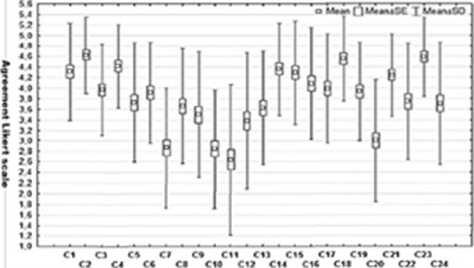8953611523
100 5 E-IEARNING AS A FORM OF FUTURĘ EDUCATION
be approachable, compassionate, and diplomalic and have good communica-tion skills to Hsten to and reward their Staff,
■ conimunication - managers aro the main linę of contact between the frontline staff, senior management and clients.They are responsible for keeping every-body informed,
■ leadership - being a leader involves persuading others to follow the direction you want to go in. As such managers le3d by example, have reasonable expec-tations of their staff and are excellent persuaders,
■ administrative and financial skills - managers will usually be expected to set budgets, manage them and carry out other admin such as writing reports. For this, they will need good numeracy, literacy and Computer literacy skills.
5.6 Students and their futurę profession
There are many reasons for going to university, including - naturally - a love of the subject to be studied, and the opportunity to experience a different way of life. Higher education is much morę than a production linę for work-ready gradu-ates. Department of Informatics FEM SUA in Nitra madę a research about futurę of graduates of manageri3l and economic focus programs. The main thrust of research in terms of a selected group of aspects is to assess the current level of education in informatics within the selected study programs of economic and managerial focus and propose the optimum development of informatics compe-tencies for futurę graduates in accordance with the requirements of the current practice and the labour market.
For screening reviews of students was used a questionnaire. With the develop-ment of the questionnaire implementation and evaluation rules of questionnaire survey were developed as well (fig. S).
Since for the purpose of our research was necessary to creatc a custom, non-standard questionnaire, we considered as necessary to verify the created questionnaire in terms of rcliability. From the total number of 1S3 items in ques-tionnaire, only 146 were includcd for the process of evaluation to the statistica! measurements. Their rating to each ordinal item, respondents expressed through the fwe-point Likert scalę, i.e. score between 1 to 5 with a median value on sub-mission neutral. emotionally indifferent response assessment. A higher degree of disagreement with the present argument is marked with a lower valuc; com-pletc disagreement is marked with a degree 1. A higher degree of agrecment with the present argument is marked with a higher value; fuli agreement is marked with a degree 5. In area of the questionnaire called My futurę profession, the students were asked ąuestions to what extent they agree or disagree with selected statements regarding the selection and decision-making about their professional orientation. The research was focused to what extent are factors like work in agreement with your attitudes and values, the use of your talent, helping oth-ers, preferring job to family, eaming money, being the boss or becoming famous important to them.
Figurę 5: Resutts of studenrs quesłionary

Ol łlu0OM«
The respondents had 24 items at their disposal (Cl - C24), with the selection of the position of the agreement on the five grade Likert scalę (5 - strongly agree, 4 - rather agree. 3 - don’t agree nor disagree. 2 - rather disagree, 1 - strongly disagree). A box plot was used for the graphfcal representatlon of the evaluation of individual questionnaire's items, depicting the median and quartile variation rangę of the evaluation of individual items.
The items (fig.5) was: Cl - work with something, which is in agreement to my attitudes and values, C2 - do you want to work with something, which is consider to be interesting and meaningful, C3 - work independently on others, C4 - use my talent and skills. C5 - work rather with people than things, C6 - help others, C7 - work with animals, C8 - work In the area of modern technologies, C9 - do
Wyszukiwarka
Podobne podstrony:
112 Krzysztof Waliszew ski the futurę will be morę common and gaining in importance. Decision-making
80 approved by the animal care committee of the Universite du Qućbec a Rimouski and have been conduc
dpp22 Gub swinging is a form of light cxcrcise whicli is of no use to the would-be strong man. as it
45895 New Forms Taschen 019 art and new expressions of the built form. As in art, there may be no do
31 (261) 3nstrurtimta for dattimt As will be judgcd, thc simplest form of tatting is the ring which
m3374 tor being almost any form of tower, a bastida being a new village or town that need not be for
mbs 062 MY BREATHING SYSTEM inhalation, as a part of " my complete breath,” no attention should
Author s Notę: This might be a work with no end, as it is almost impossible to think of there c
181 Vol. 36(2), 2001 could be considered as a subfamily of Potamididae. In comparison with the data
htdctmw 024 THE POWER OF- PERSPECTIWE! Just as FORM is all-important in making an object look real,
PASTENGLISH TENSES lllutlnlcd willi and esamplc of lycanthropyI will be a hliman being one day. Futu
3.3 Enterprise Resource Planning - ERP The Computer system of an ERP class can be defined as a
więcej podobnych podstron